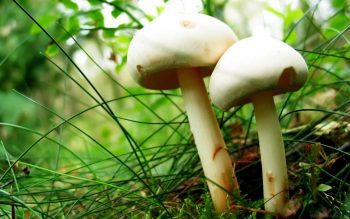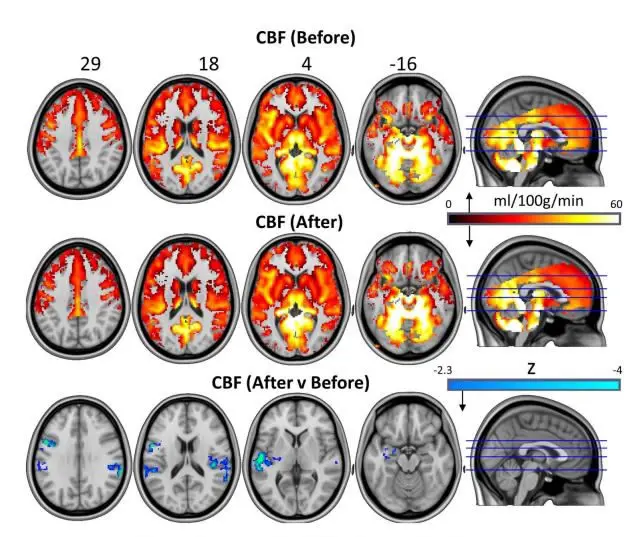By Michael Forrester
Guest writer for Wake Up World
According to recent research, taking psilocybin, a psychedelic compound which occurs naturally in “magic mushrooms,” can safely improve the moods of patients with advanced-stage cancer and anxiety. Now researchers have shown it reduces symptoms of depression weeks after treatment following a ‘reset’ of brain activity.
Psilocybin mushrooms are one of many powerful psychedelics that can treat mental disorders and enhance human consciousness. They have long been studied for their spiritual effects. In 2006, Johns Hopkins University studied psilocybin in particular and found that one-third of all participants reported that the experience was the single most spiritually significant moment of their lives and more than two-thirds reported it was among the top five most spiritually significant experiences. Two months after the study, 79% of the participants reported increased well-being or satisfaction; friends, relatives, and associates confirmed this.
“Political and cultural pressures forced an end to these studies in the 1970s,” said Charles S. Grob, MD. Today they are being revived like never before.
New findings come from a study in which researchers from Imperial College London used psilocybin to treat a small number of patients with depression in whom conventional treatment had failed. In a paper entitled “Psilocybin for treatment-resistant depression: fMRI-measured brain mechanisms“ and published recently in the journal Scientific Reports, the researchers describe patient-reported benefits lasting up to five weeks after treatment, and believe the psychedelic compound may effectively reset the activity of key brain circuits known to play a role in depression. Comparison of images of patients’ brains before and one day after they received the treatment revealed changes in brain activity that were associated with marked and lasting reductions in depressive symptoms.
The authors note that while the initial results of the experimental therapy are exciting, they are limited by the small sample size as well as the absence of a control group — such as a placebo group — to directly contrast with the patients.
Dr Robin Carhart-Harris, Head of Psychedelic Research at Imperial, who led the study, said:
“We have shown for the first time clear changes in brain activity in depressed people treated with psilocybin after failing to respond to conventional treatments.
“Several of our patients described feeling ‘reset’ after the treatment and often used computer analogies. For example, one said he felt like his brain had been ‘defragged’ like a computer hard drive, and another said he felt ‘rebooted’. Psilocybin may be giving these individuals the temporary ‘kick start’ they need to break out of their depressive states and these imaging results do tentatively support a ‘reset’ analogy…”
Over the last decade or so, a number of clinical trials have been conducted into the safety and effectiveness of psychedelics in patients with conditions such as depression and addictions, yielding promising results.
In the recent Imperial trial, the first with psilocybin in depression, 20 patients with treatment-resistant form of the disorder were given two doses of psilocybin (10 mg and 25 mg), with the second dose a week after the first. Nineteen of these underwent initial brain imaging and then a second scan one day after the high dose treatment. Carhart-Harris and team used two main brain imaging methods to measure changes in blood flow and the crosstalk between brain regions, with patients reporting their depressive symptoms through completing clinical questionnaires.
Immediately following treatment with psilocybin, patients reported a decrease in depressive symptoms — corresponding with anecdotal reports of an ‘after-glow’ effect characterised by improvements in mood and stress relief.
Functional MRI imaging revealed reduced blood flow in areas of the brain, including the amygdala, a small, almond-shaped region of the brain known to be involved in processing emotional responses, stress and fear. They also found increased stability in another brain network, previously linked to psilocybin’s immediate effects as well as to depression itself.
These findings provide a new window into what happens in the brains of people after they have ‘come down’ from a psychedelic, where an initial disintegration of brain networks during the drug ‘trip’, is followed by a re-integration afterwards.
Dr Carhart-Harris explained:
“Through collecting these imaging data we have been able to provide a window into the after effects of psilocybin treatment in the brains of patients with chronic depression. Based on what we know from various brain imaging studies with psychedelics, as well as taking heed of what people say about their experiences, it may be that psychedelics do indeed ‘reset’ the brain networks associated with depression, effectively enabling them to be lifted from the depressed state.”
The authors warn that while the initial findings are encouraging, the research is at an early stage and that patients with depression should not attempt to self-medicate, as the team provided a special therapeutic context for the drug experience and things may go awry if the extensive psychological component of the treatment is neglected. They add that future studies will include more robust designs and currently plan to test psilocybin against a leading antidepressant in a trial set to start early next year.
Professor David Nutt, Edmond J. Safra Professor of Neuropsychopharmacology and director of the Neuropsychopharmacology Unit in the Division of Brain Sciences, and senior author of the paper, added:
“Larger studies are needed to see if this positive effect can be reproduced in more patients. But these initial findings are exciting and provide another treatment avenue to explore.”
Recommended articles by Michael Forrester:
- 6 Shifts In Consciousness We Are All Experiencing Right Now
- Fascinating New Study Shows How Emotions Are Mapped On The Human Body
- Scientists Confirm There is a Second, Secret DNA Code That Controls Genes
- Researchers Finally Show How Mindfulness & Your Thoughts Can Induce Specific Molecular Changes To Your Genes
- Mathematical Proof That Cooperative, Forgiving & Generous Populations Succeed While Selfish Ones Fail
- 97 Percent of Our DNA Has a Higher Purpose And Is Not ‘Junk’ As Labeled By Scientists
- 5 Powerful Psychedelics That Treat Mental Disorders and Change Human Consciousness by Reorganizing the Brain
- The Powerful Effect of Heart-Centered Healing on The Human Body – 7 Simple Actions You Can Take
About the author:
Michael Forrester is a spiritual counsellor and is a practising motivational speaker for corporations in Japan, Canada and the United States. You can follow Michael at preventdisease.com, where this article first appeared.

If you've ever found value in our articles, we'd greatly appreciate your support by purchasing Mindful Meditation Techniques for Kids - A Practical Guide for Adults to Empower Kids with the Gift of Inner Peace and Resilience for Life.
In the spirit of mindfulness, we encourage you to choose the paperback version. Delve into its pages away from screen glare and notifications, allowing yourself to fully immerse in the transformative practices within. The physical book enriches the learning process and serves as a tangible commitment to mindfulness, easily shared among family and friends.
Over the past few years, Wake Up World has faced significant online censorship, impacting our financial ability to stay online. Instead of soliciting donations, we're exploring win-win solutions with our readers to remain financially viable. Moving into book publishing, we hope to secure ongoing funds to continue our mission. With over 8,500 articles published in the past 13 years, we are committed to keeping our content free and accessible to everyone, without resorting to a paywall.








